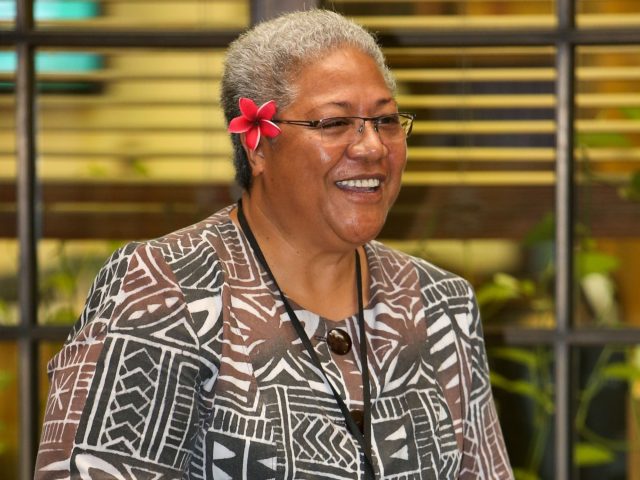Samoa’s expected new prime minister said Thursday she plans to cancel a China-backed port development project on the island worth $100 million out of concern Samoa is already overly indebted to Beijing.
“Samoa is a small country. Our seaports and our airports cater for our needs,” Fiame Naomi Mataafa (pictured) told Reuters in a telephone interview.
“It’s very difficult to imagine that we would need the scale that’s being proposed under this particular project when there are more pressing projects that the government needs to give priority to,” Fiame said.
“The level of indebtedness of our government to the government of China was a pressing issue for voters,” she said, referring to Samoa’s general election last month.
Fiame is a Samoan opposition leader set to become the nation’s next prime minister after Samoa’s top court on May 17 validated her April general election win. Fiame’s election victory unseated Tuilaepa Sailele Malielegaoi, Samoa’s prime minister since 1998 and a longtime ally of China. Tuilaepa was a major supporter of Samoa’s Beijing-backed port development in Vaiusu Bay, which was projected to begin later this year through a Chinese loan worth $100 million.
“Who will be responsible to pay for the wharf loan of [WST] $250 million [almost $100 million]?,” Samoan Minister of Parliament Faumuina Wayne Fong asked Samoa’s parliament in February.
“The children and grandchildren of Vaiusu will suffer in the long run. We still owe China [WST] $400 million [about $160 million] in debts from the past. We do not have enough coconuts to repay the Chinese back for all these loans,” Faumuina said.
China is the single largest creditor to Samoa and accounts for roughly 40 percent of the South Pacific island’s external debts, which are estimated to equal about $160 million. Samoa’s Chinese loans are funded through Beijing’s Belt and Road Initiative (BRI), which aims to expand China’s global influence by building infrastructure and social projects in developing nations worldwide. BRI projects are typically based upon predatory loans constructed so that the economies of vulnerable developing nations often slip into effective debt traps to China.
Reuters reported on May 5 that China had recently “drawn up plans to upgrade an airstrip and bridge on one of Kiribati’s remote islands.”
Kiribati is a South Pacific nation located northeast of Samoa and about 1,800 miles southwest of the U.S. state of Hawaii.
“The plans, which have not been made public, involve construction on the tiny island of Kanton (also spelled Canton), a coral atoll strategically located midway between Asia and the Americas,” according to Reuters.
Kiribati opposition legislator Tessie Lambourne expressed concern about the project to Reuters on May 5, adding that she and her fellow opposition lawmakers “wanted to know whether it was part of China’s Belt and Road Initiative.”
“The government hasn’t shared the cost and other details other than it’s a feasibility study for the rehabilitation of the runway and bridge,” Lambourne said.
“The opposition will be seeking more information from [Kiribati’s] government in due course,” she assured.

COMMENTS
Please let us know if you're having issues with commenting.